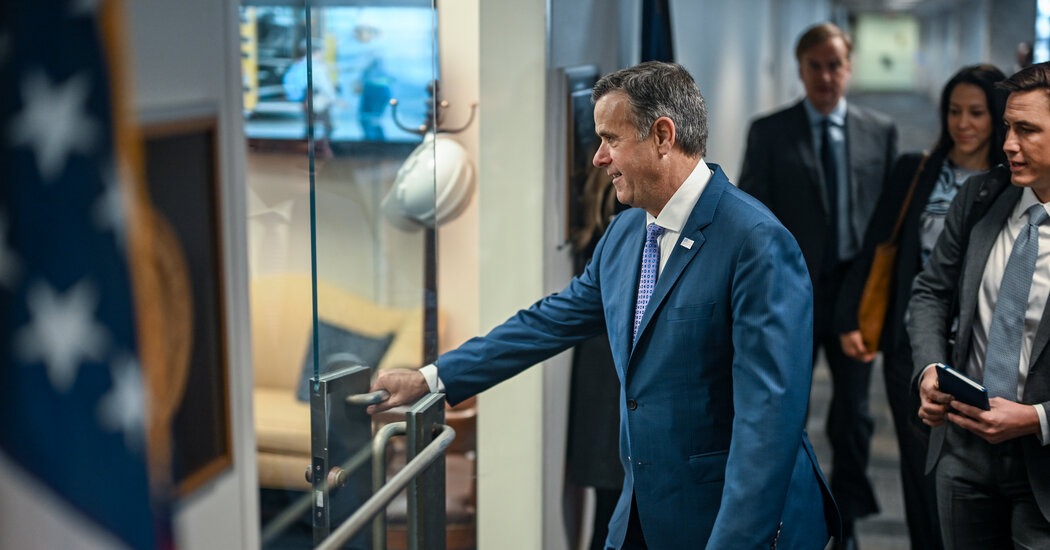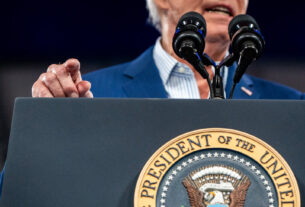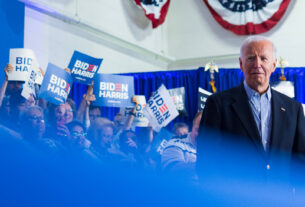John Ratcliffe, President-elect Donald J. Trump’s pick for C.I.A. director, is set to offer his vision for a more aggressive spy agency as he fields questions from senators on Wednesday about his intelligence priorities and ability to deliver unvarnished assessments.
Mr. Ratcliffe’s confirmation is all but assured, and he is likely to be voted on by the full Senate soon after Mr. Trump’s inauguration on Monday. During the first Trump administration, the Senate confirmed Mr. Ratcliffe, 49 to 44, to serve as the director of national intelligence. He was the first national intelligence chief installed without support from the opposition party.
But now, senators from both parties view Mr. Ratcliffe as one of the more qualified senior officials picked by Mr. Trump, whose focus on the threat from China is widely shared by Republican and Democratic lawmakers.
Mr. Ratcliffe is expected to outline his vision of an agency that offers intelligence free of political bias. While he said he would not discuss specific intelligence priorities, he promised he would make the C.I.A. less averse to risk and more willing to conduct covert action when ordered by the president, “going places no one else can go and doing things no one else can do.”
According to his prepared remarks, Mr. Ratcliffe promised that the C.I.A. would collect intelligence in every part of the globe, “no matter how dark or difficult.”
He also pledged that the agency’s analysis would be objective, “never allowing political or personal biases to cloud our judgment or infect our products.”
Mr. Ratcliffe evoked the C.I.A.’s predecessor — the Office of Strategic Services — and said the ideal recruit for the agency would be a “Ph.D. who could win a bar fight.”
“This sentiment is the essence of what today’s C.I.A. must recapture,” Mr. Ratcliffe is expected to say, according to his prepared remarks.
Mr. Ratcliffe seems likely to win some Democratic support for this nomination, but how much is unclear. The Democratic minority is expected to ask Mr. Ratcliffe about Mr. Trump’s attacks on the intelligence community and Mr. Ratcliffe’s ability to deliver intelligence that might be at odds with Mr. Trump’s worldview.
Throughout his first term in office, Mr. Trump attacked the intelligence agencies and their leaders. He has often referred darkly to “the deep state,” a group of national security officials opposed to his agenda. And he and his aides have discussed pushing out government officials whom they view as disloyal to the White House.
Senator Mark Warner, Democrat of Virginia and the vice chairman of the Intelligence Committee, is expected to ask Mr. Ratcliffe about Mr. Trump’s attacks.
“These comments affect the morale of these dedicated men and women, many of whom risk their lives in anonymity to protect our nation and who do so without regard to which party is in power or who holds the office of president,” Mr. Warner is set to say, according to his prepared remarks.
The hearing, Mr. Warner will argue, is Mr. Ratcliffe’s opportunity to reassure C.I.A. employees that they will not face reprisal for “speaking truth to power.”
In his opening statement, Mr. Ratcliffe will say he wants the C.I.A. to be the “ultimate meritocracy.” He is also set to say that he will empower the “courageous risk takers and innovators” but not tolerate anything distracting from the core mission.
While the director of national intelligence is responsible for preparing the President’s Daily Brief, which contains intelligence analysis from all of the nation’s spy agencies, the C.I.A. director also frequently briefs the president.
Some Democratic lawmakers have voiced concern about whether Mr. Trump’s choices for top intelligence posts will deliver unvarnished intelligence. Mr. Ratcliffe had a close relationship with Mr. Trump, especially at the end of the administration, and took over some of the intelligence briefing duties often handled by less senior intelligence officers.
During Mr. Trump’s first term, Mr. Ratcliffe issued public warnings about election interference in 2020 that drew attention to efforts by Russia, Iran and China to influence the vote. Subsequent intelligence assessments by the Biden administration supported Mr. Ratcliffe’s warnings. But he also declassified some intelligence related to Russia’s activities in 2016 over the objections of C.I.A. officials who thought the release of the material would harm sources and collection methods.
Mr. Warner is expected to ask Mr. Ratcliffe to pledge to provide “unbiased, unvarnished and timely intelligence assessments” to the president and Congress.
Senator Tom Cotton, Republican of Arkansas and the new chairman of the Intelligence Committee, is expected to criticize the U.S. intelligence community for failing to anticipate threats, like the Hamas-led attack on Israel on Oct. 7, 2023, and call on Mr. Ratcliffe to push for changes at the C.I.A. to help the agency “get back to its roots.”
According to a copy of his prepared remarks, Mr. Cotton said the C.I.A. had neglected its core mission of secretly collecting foreign intelligence.
“Put more simply, stealing secrets,” Mr. Cotton was set to say. “Intelligence collection is the main effort; every other job is a supporting effort.”
Mr. Cotton said he had seen too many intelligence reports based on news accounts or diplomatic cables.
“Those sources aren’t unimportant, but without clandestine intelligence, we might as well get briefed by the State Department or a think tank, or just read the newspaper,” Mr. Cotton was set to say.
As director of national intelligence, Mr. Ratcliffe called for more resources to be devoted to understanding China, which he said was the top national security threat.
Intelligence officials in the Biden administration accepted much of Mr. Ratcliffe’s critique. Under William J. Burns, the director, the C.I.A. created a new China Mission Center and stepped up spending on collecting intelligence in China and analyzing the country.
In his opening statement, Mr. Ratcliffe said the C.I.A. would continue and intensify its focus on threats from China. He praised the establishment of the China mission center under the Biden administration, even as he said more would be done.
“This is our once-in-a-generation challenge,” he said, according to his prepared remarks. “The intelligence is clear. Our response must be as well.”





